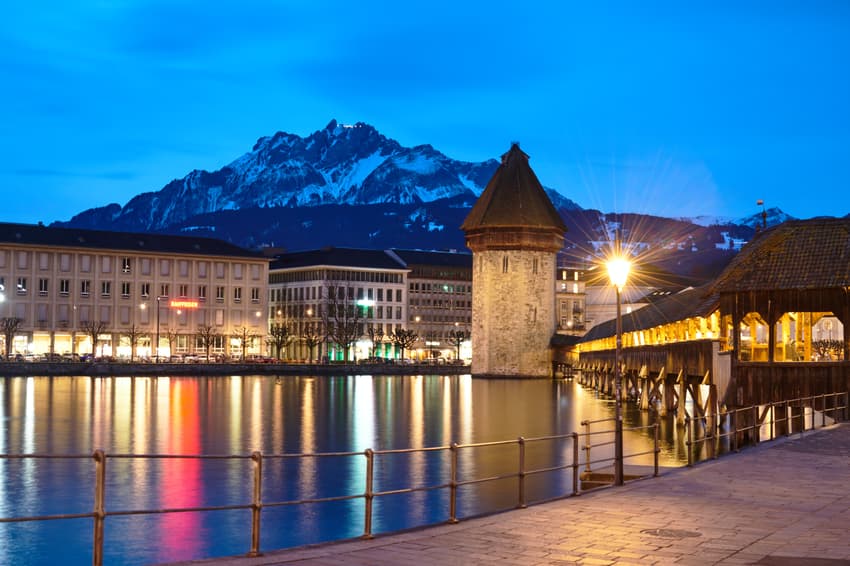MAP: Which Swiss cities will be most impacted by a gas shortage this winter?

With Switzerland facing the possibility of a gas shortage this winter the government is warning people to lower their energy consumption - but certain cities are more heavily dependant on gas than others.
The government has already warned the population that due to the imminent shortage of natural gas from Russia, Swiss households should prepare to lower the heat in their homes this winter.
“We are not an island, so the war in Ukraine and the global energy crisis also affect Switzerland. In this context, there is no certainty about what awaits us”, Energy Minister Simonetta Sommaruga said.
READ ALSO: ‘It could hit us hard’: Switzerland prepares for impending gas shortage
Not all Swiss households depend on gas for heating, and a possible gas shortage would hit harder in those with large percentages of homes heated with gas.
For instance, in Solothurn, 65 percent of residential buildings depend on gas for heating. That proportion is 60 percent in Biel, 55 percent in Lucerne, 51 percent in Zurich, 47 percent in Bern, 46.2 percent in Geneva, and 43 percent in Basel.
A 'step by step' emergency plan
In case of shortages, the Swiss government has already stated that residents would receive preferential treatment. A first step would be requiring businesses to lower consumption and swap from gas to oil reserves.
Private apartments and houses would still be supplied if facilities such as industrial and office buildings, sports facilities, schools and administration buildings ran out of gas.
Still, homes in Switzerland need to be prepared to lower their heating. Energy suppliers in Switzerland also appeal to the people to reduce their consumption. For example, they can start by taking shorter or cooler showers or washing their clothes at 30C instead of 40C.
"The gas we save today is then available to us in winter", Gabriela Hübscher, a spokesperson for the energy company EWL in Lucerne, said.
READ ALSO: EXPLAINED: Why you should hold off on buying electric heaters in Switzerland
Once the cold arrives, reducing the heating at home also helps, as heating your home by one degree less can reduce energy consumption by 6 percent. The energy companies also suggest people turn down the heating when leaving their houses and invest in better window sealing to increase efficiency.
Several of Switzerland's neighbours have issued guidelines on heating for homes - although these remain voluntary - with the French and Italian governments suggesting that heating should not be turned higher than 19C.
So far in Switzerland there is no discussion of heating limits or measures such as turning on the heating in private residences later in the season. Still, market experts warn that currently, nobody can rule out any worst-case scenarios.
Comments
See Also
The government has already warned the population that due to the imminent shortage of natural gas from Russia, Swiss households should prepare to lower the heat in their homes this winter.
“We are not an island, so the war in Ukraine and the global energy crisis also affect Switzerland. In this context, there is no certainty about what awaits us”, Energy Minister Simonetta Sommaruga said.
READ ALSO: ‘It could hit us hard’: Switzerland prepares for impending gas shortage
Not all Swiss households depend on gas for heating, and a possible gas shortage would hit harder in those with large percentages of homes heated with gas.
For instance, in Solothurn, 65 percent of residential buildings depend on gas for heating. That proportion is 60 percent in Biel, 55 percent in Lucerne, 51 percent in Zurich, 47 percent in Bern, 46.2 percent in Geneva, and 43 percent in Basel.
A 'step by step' emergency plan
In case of shortages, the Swiss government has already stated that residents would receive preferential treatment. A first step would be requiring businesses to lower consumption and swap from gas to oil reserves.
Private apartments and houses would still be supplied if facilities such as industrial and office buildings, sports facilities, schools and administration buildings ran out of gas.
Still, homes in Switzerland need to be prepared to lower their heating. Energy suppliers in Switzerland also appeal to the people to reduce their consumption. For example, they can start by taking shorter or cooler showers or washing their clothes at 30C instead of 40C.
"The gas we save today is then available to us in winter", Gabriela Hübscher, a spokesperson for the energy company EWL in Lucerne, said.
READ ALSO: EXPLAINED: Why you should hold off on buying electric heaters in Switzerland
Once the cold arrives, reducing the heating at home also helps, as heating your home by one degree less can reduce energy consumption by 6 percent. The energy companies also suggest people turn down the heating when leaving their houses and invest in better window sealing to increase efficiency.
Several of Switzerland's neighbours have issued guidelines on heating for homes - although these remain voluntary - with the French and Italian governments suggesting that heating should not be turned higher than 19C.
So far in Switzerland there is no discussion of heating limits or measures such as turning on the heating in private residences later in the season. Still, market experts warn that currently, nobody can rule out any worst-case scenarios.
Join the conversation in our comments section below. Share your own views and experience and if you have a question or suggestion for our journalists then email us at [email protected].
Please keep comments civil, constructive and on topic – and make sure to read our terms of use before getting involved.
Please log in here to leave a comment.